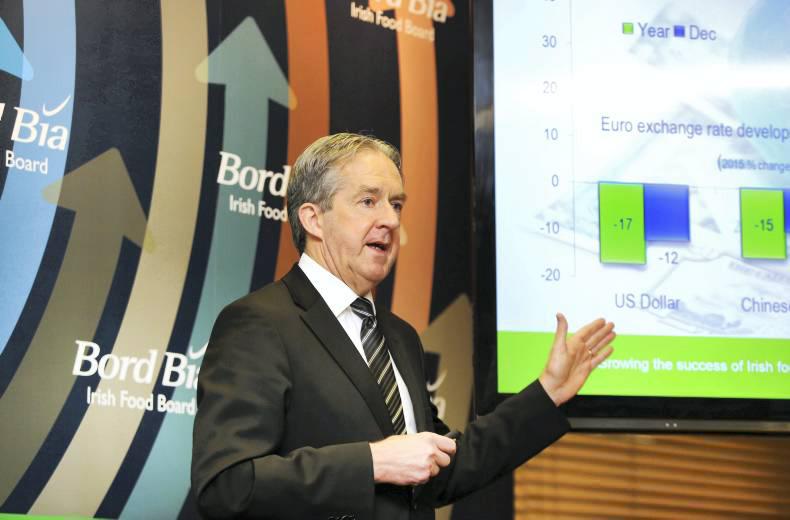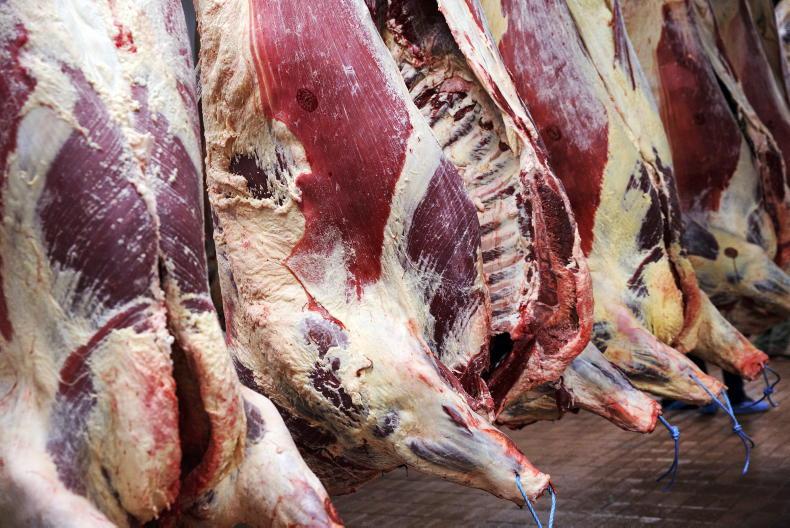Speaking at the Joint Committee on Agriculture on Tuesday, Aidan Cotter, Bord Bia’s chief executive, said that Bord Bia does not have enough resources at the moment to deal with the challenges posed by the UK’s exit from the EU.
“We will have to put more resources towards it,” he said. “It would be difficult for me to say truthfully that, yes, we have sufficient resources given the challenge ahead. That would understate the challenge the industry is facing.”
The CEO added that Bord Bia is currently working through the resources and initiatives that will be needed to be taken to cope with Brexit.
Some of the measures taken by Bord Bia to increase resources since the Brexit vote in June include the opening of two new offices, one in Warsaw to expand support in eastern Europe, and one in Singapore to service eight emerging markets in southeast Asia. Bord Bia’s London team was also recently boosted with a new member of staff dedicated to Brexit support measures for Irish companies in the market.
Huge challenge in growing exports
Cotter added that “irrespective of Brexit”, there is “a huge challenge in growing our exports”, according to the targets set out in Food Wise 2025, the Government’s road map for the agricultural industry, which projects an increase in the value of agri-food exports by 85% to €19bn.
We’ve projected that we would have to reduce our share of exports to the UK down to 32% in a soft Brexit and 23% in hard Brexit
“Our food exports would have to grow by about 40% to 70% over the next 10 years to reach Food Wise 2025 targets,” he said. “Right now, about 41% of our food and drink exports go to the UK. We’ve projected that we would have to reduce our share of exports to the UK down to 32% in a soft Brexit and 23% in hard Brexit. So that’s a big challenge in the context of Food Wise 2025.”
Currency volatility
Referring to currency, Cotter said that “very few people” were prepared for the volatility in currency brought about by the Brexit vote.
He added that the only thing companies could have done is “hedge forward” when the currency rate was good if they had cause to believe the UK would leave the EU.
“However, a lot of people were taken unawares by the vote and it was not clear to many companies what they could do about it. There is still uncertainty there,” Cotter continued. “The only thing we can do is learn to manage the volatility - those are the companies that will win.”
While there has been some relief over recent weeks as sterling recovered somewhat, it remains 11% weaker against the euro than prior to the result of the referendum vote in June and 15% lower than the start of 2016.
Read more
Beef prices to fall 12% next year – Teagasc
Speaking at the Joint Committee on Agriculture on Tuesday, Aidan Cotter, Bord Bia’s chief executive, said that Bord Bia does not have enough resources at the moment to deal with the challenges posed by the UK’s exit from the EU.
“We will have to put more resources towards it,” he said. “It would be difficult for me to say truthfully that, yes, we have sufficient resources given the challenge ahead. That would understate the challenge the industry is facing.”
The CEO added that Bord Bia is currently working through the resources and initiatives that will be needed to be taken to cope with Brexit.
Some of the measures taken by Bord Bia to increase resources since the Brexit vote in June include the opening of two new offices, one in Warsaw to expand support in eastern Europe, and one in Singapore to service eight emerging markets in southeast Asia. Bord Bia’s London team was also recently boosted with a new member of staff dedicated to Brexit support measures for Irish companies in the market.
Huge challenge in growing exports
Cotter added that “irrespective of Brexit”, there is “a huge challenge in growing our exports”, according to the targets set out in Food Wise 2025, the Government’s road map for the agricultural industry, which projects an increase in the value of agri-food exports by 85% to €19bn.
We’ve projected that we would have to reduce our share of exports to the UK down to 32% in a soft Brexit and 23% in hard Brexit
“Our food exports would have to grow by about 40% to 70% over the next 10 years to reach Food Wise 2025 targets,” he said. “Right now, about 41% of our food and drink exports go to the UK. We’ve projected that we would have to reduce our share of exports to the UK down to 32% in a soft Brexit and 23% in hard Brexit. So that’s a big challenge in the context of Food Wise 2025.”
Currency volatility
Referring to currency, Cotter said that “very few people” were prepared for the volatility in currency brought about by the Brexit vote.
He added that the only thing companies could have done is “hedge forward” when the currency rate was good if they had cause to believe the UK would leave the EU.
“However, a lot of people were taken unawares by the vote and it was not clear to many companies what they could do about it. There is still uncertainty there,” Cotter continued. “The only thing we can do is learn to manage the volatility - those are the companies that will win.”
While there has been some relief over recent weeks as sterling recovered somewhat, it remains 11% weaker against the euro than prior to the result of the referendum vote in June and 15% lower than the start of 2016.
Read more
Beef prices to fall 12% next year – Teagasc









SHARING OPTIONS